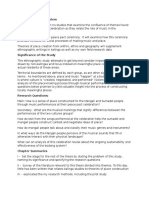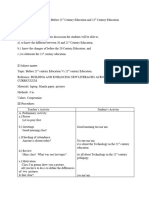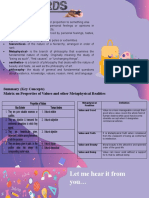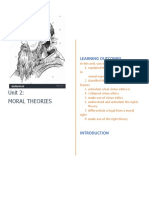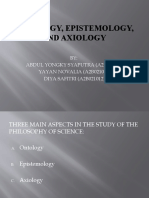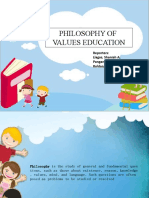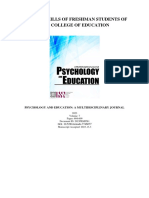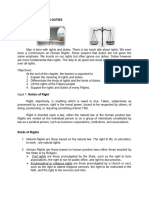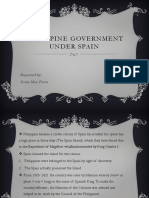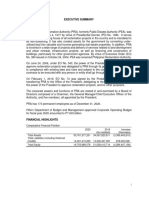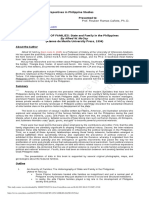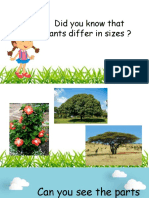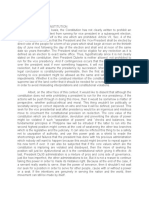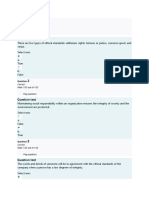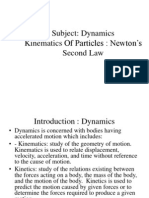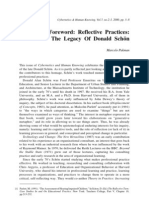0 ratings0% found this document useful (0 votes)
324 viewsEthics 101 Final Requirements
Ethics 101 Final Requirements
Uploaded by
frustratedlawstudentThis document appears to be a student paper analyzing the 2010 film "Unthinkable" and discussing the moral dilemma of torture. The paper explores whether the ends ever justify the means through the lens of the film. It discusses utilitarian perspectives on maximizing benefits to society through torture, as well as moral reservations about torture. The effectiveness of torture is also questioned. The student concludes that once a country justifies torture, it loses moral authority to condemn torture elsewhere. Standard moral dilemmas involving greater harm are also addressed. A second section discusses how studying ethics has impacted the student as a thinking person and human being by helping them think more critically and consider moral questions.
Copyright:
© All Rights Reserved
Available Formats
Download as DOCX, PDF, TXT or read online from Scribd
Ethics 101 Final Requirements
Ethics 101 Final Requirements
Uploaded by
frustratedlawstudent0 ratings0% found this document useful (0 votes)
324 views17 pagesThis document appears to be a student paper analyzing the 2010 film "Unthinkable" and discussing the moral dilemma of torture. The paper explores whether the ends ever justify the means through the lens of the film. It discusses utilitarian perspectives on maximizing benefits to society through torture, as well as moral reservations about torture. The effectiveness of torture is also questioned. The student concludes that once a country justifies torture, it loses moral authority to condemn torture elsewhere. Standard moral dilemmas involving greater harm are also addressed. A second section discusses how studying ethics has impacted the student as a thinking person and human being by helping them think more critically and consider moral questions.
Original Title
ETHICS 101 FINAL REQUIREMENTS
Copyright
© © All Rights Reserved
Available Formats
DOCX, PDF, TXT or read online from Scribd
Share this document
Did you find this document useful?
Is this content inappropriate?
This document appears to be a student paper analyzing the 2010 film "Unthinkable" and discussing the moral dilemma of torture. The paper explores whether the ends ever justify the means through the lens of the film. It discusses utilitarian perspectives on maximizing benefits to society through torture, as well as moral reservations about torture. The effectiveness of torture is also questioned. The student concludes that once a country justifies torture, it loses moral authority to condemn torture elsewhere. Standard moral dilemmas involving greater harm are also addressed. A second section discusses how studying ethics has impacted the student as a thinking person and human being by helping them think more critically and consider moral questions.
Copyright:
© All Rights Reserved
Available Formats
Download as DOCX, PDF, TXT or read online from Scribd
Download as docx, pdf, or txt
0 ratings0% found this document useful (0 votes)
324 views17 pagesEthics 101 Final Requirements
Ethics 101 Final Requirements
Uploaded by
frustratedlawstudentThis document appears to be a student paper analyzing the 2010 film "Unthinkable" and discussing the moral dilemma of torture. The paper explores whether the ends ever justify the means through the lens of the film. It discusses utilitarian perspectives on maximizing benefits to society through torture, as well as moral reservations about torture. The effectiveness of torture is also questioned. The student concludes that once a country justifies torture, it loses moral authority to condemn torture elsewhere. Standard moral dilemmas involving greater harm are also addressed. A second section discusses how studying ethics has impacted the student as a thinking person and human being by helping them think more critically and consider moral questions.
Copyright:
© All Rights Reserved
Available Formats
Download as DOCX, PDF, TXT or read online from Scribd
Download as docx, pdf, or txt
You are on page 1of 17
Republic of the Philippines
Bulacan State University
Guinhawa, City of Malolos, Bulacan
College of Criminal Justice Education
ETHIC
101 S
Quarantine Requirements
In Final Fulfillment of the unit requirements in Ethics 101
Lacbayan, Ma. Victoria C.
Bachelor of Science in Legal Management 1-C
Mr. Sherwin M. Pariñas, PhD.
The Unthinkable makes it thinkable
The movie’s storyline stages a generic situation of counterterrorism that involves the
moral dilemma of choosing between saving countless lives from an imminent attack on one hand
and physically abusing an individual in possession of relevant information on the other. This
scenario is known as “the ticking bomb situation”. In this situation described earlier, thousands
of lives can be saved by an immoral act against one. The fact that we have to inflict harm to a
person in our direct continuity makes it more personal than the harm that might befall thousands
of innocent, but at the same time unknown citizens. It is by avoiding the moral dilemma from
becoming personal that we can make decisions which we otherwise might not have made. In the
movie, We can see these processes unfold. The moral dilemma is kept impersonal by bringing in
an anonymous outsider to inflict the torture to the suspected terrorist instead of inflicting
physical violence itself. But the more the FBI agent starts to see the terrorist as a human being,
the harder it becomes to condone the immoral behavior of the interrogator.
In description, Do the ends ever justify the means? Unthinkable makes it clear that the
pain and possible killing of one man is surpass by the saving of the millions of innocent lives that
hang in the balance. If the ends apparently justify the means, then the means become the vehicle
for becoming those we despise. This underscores the dilemma when How far will H and Brody
go to save the innocent? The counterterrorist on one side see no difference between soldiers and
civilians. Applying a consequentialist approach to the decision whether or not to torture an
individual, such logic evaluates possible actions only in terms of their consequences without
moral factors. In addition, the legalization of torture could be essential in regulating and
monitoring a practice that is used despite its prohibition. While in a utilitarian perspective,
torturing an individual still maximizes the benefits for the society. So without any moral
consideration, in order to save group of people, you could keep on torturing and killing up to
almost of its whole population.
It seems that the probability of legalizing torture is not only subjected to moral reserves but
also to doubts on its effectiveness and a vast array of subjective factors that would make torture
an improper solution even in a worst-case scenario such as the one shown in “Unthinkable”. In
the movie, there is evidence beyond reasonable doubt that the terrorist withholding true
information of quick importance affecting a significantly number of people, and that person
would consider the end, protecting that great number of uninvolved people. This falls within
equal standard ethical dilemmas of greater good or least harm. In order to put morality into
society, one of the ways is by putting its values into literary works. Through the movie, the
dilemma between rationality and conscience is reflected, also shows how important the
application of Utilitarianism on that situation.
It left this viewer more interested in calculating a score for torture than debating whether
it was justified. the terrorist has no good, let alone decisive, justificatory moral reason for
murdering them. In general, it can consider torture both wrong in principle and often considered
to be of little use compared with benefits gained, rapidly being over-used. Through the
development of knowledge, morality can no longer be a basic consideration to define the truth.
Torture is not a proper instrument of the State. Once a country justifies torture, it then loses any
moral authority to condemn torture. Here, the aim is to prevent greater harm so it moves into a
standard moral dilemma. At Last, Standard moral dilemmas are normally presented in terms
where one knows one's action will be effective so the decision is whether to execute one
unethical act to prevent greater harm. Here, we do not know it will be effective.
How Ethics changed my life as a human being and as a thinking person?
Ethics by its meaning is a branch of philosophy that involves systematizing, defending, and
recommending concepts of right and wrong conduct. It is derived from the Greek word: “ethos”
which means “characteristic way of acting”. Thus, ethics studies the characteristics of behavior
of man as endowed reason and free will. Ethics seeks to resolve questions of human morality by
defining concepts such as good and evil, right and wrong, virtue and vice, justice and crime.
Ideal human behavior and ideal ways of being. It let me meant having the freedom to exercise
my autonomy or self-determination, not being used as a means to an end, thus being treated with
dignity and having the capability to think rationally. It gives me understand, analyze, and
distinguish matters of right and wrong, admirable as they related to the well-being of a person
and the relationships among sentient beings like me.
Base on my observation with the discussions we have on ethics. It is an active process
rather than a static condition, Why? Well When people are doing ethics. They need to support
their beliefs and assertions with sound reasoning. They ought to justify their positions through
logical and continuous thinking.
It helps me to think out of the box, have the sense of rationality. Expand our avenue of
thinking. It teaches how to examine human nature and what is need for us to move toward well-
being. Achieve self-direction, understand that we do not consist with a self at all. As contrasted
with ethics, morals are specific beliefs, behaviors and ways of being derive from doing ethics.
People consider matters of ethics, they usually are considering matters about freedom regarding
personal choices, one’s obligations to other sentient or judgments about human character.
According to Donahue (1996), In the world today, “We are in the thores of a giant ethical
leap that is essentially embracing all of humankind. Ethical directives for me are not always
clearly evident, and us people sometimes disagree what is right and wrong. We lead to believe
that ethics can be just based merely on personal opinions. However, if we enter the worldwide-
view about ethics, we must make more practice ethics based simply on our personal opinions or
unexamined beliefs that are proposed by other people. It is important for us to have a basic
understanding of the concepts and theories that have been used in studying ethics so that we can
determine and analyze ethical issues and dilemmas that are relevant to the social cancers of our
society.
Sometimes I just satisfied on “We all live with Love & Strife “, I’m always longing for
love and it thinks to be our main reason why we are living. But at some point, that love turns into
strife especially if we don’t take back the love that we want, ending us up a little bit angrier. We
always feel shallow and wants for a turn in the cycle. That’s why I seek for change cause it’s
only permanence in this world. And we should make our own Histority by creating that
metaphysical change to create a legacy for our lives. Often time, breaking the rules I’ve used to,
makes me like I’m living my own reality as well. Cause reality is quiet exhausting, right? We’re
all want to exile from it. But I learnt from ethics is we’re being/nothing, we, as a Being is Never-
less & Never-will. What does it mean? We as a being is such nothing but it doesn’t mean that
we can do all things we want without considering ethically. Though we must be Never-less for
our past and Never-will for our future, without any accessory from that two, We should all only
focus on building our present lives not with what we want but what ethics want to deliver our
lives.
Even we have a limited time to discussed the whole point of studying ethics, still our
professor leaves his lecture a reason for me why we should need ethics. First reason is that we
may get more light for our daily problems. We often encounter moral dilemma in our life. Within
such situation, one must decide because not deciding would mean avoiding responsibility and it
would be morally wrong. Ethics will guide us in those situations, play an important role to guide
our decision in our daily problems. Second, is that it makes clearer to us why one act is better
than another. It is only through ethics we can compare two acts or persons why one is good and
is bad. Third, is “Morality is the best way of living”. Since our professor was a former
seminarist, he also provide some reflective point about the Fourth reason why we need ethics is
that morality helps us to see what are the prevalent sins and moral dangers of our day and thus
arouse us to put the weight of our blame and praise where they are needed.
The purpose of ethics was explicit by our prof. at the beginning. The goal of a theory of
ethics was to determine what is good, both for the individual and for the society. As per
discussed based our reading materials. For the Greeks, Ethics was to develop virtuous and moral
character. Their ancient philosophy believes in “cosmocentrism” such that everything is from
the” cosmo or universe”. It is merely based on our sense accords to Thales, Urstoff states that
the origin of things is apeiron or invisible, while Anaximander determined life as “indeterminate
boundless”. We also have Ethics from western culture involves theological perspective like the
ethics proposed by St. Augustine, St. Thomas Aquinas, and other religious ethical philosophers
tends to be based on a belief in confluence and human flaws that require and intermediary to
transcend these imperfections.
They believe that such character would make one know the right thing to do and live the
right way of life. Later, modern philosophers like Hobbes, Hume and Kant have taken different
positions in defining what is good, on how to deal with conflicting priorities of individuals
versus the whole, over the universality of ethical principles versus “situation ethics” in which
what is right depends upon the circumstances rather than on some general law and over whether
goodness is determined by the results of the action or the means by results are achieved by
(relativism, universalism, Kantianism).
Ethical determinations are applied through the use by formal theories and code of conduct
that we use to develop for professions and religions. Utilitarianism makes me emphasizes the
consequences of my actions in about achieving the most good for the people that may be affected
by my action. Every action we take includes consequentialism which the determine of our
action’s good is based on its effect.
Cultural relativism on the other hand is ethical theory that our moral evaluation is rooted in
and cannot be separated from the experience be what is wrong with another culture may not be
so in another. There’s some belief that it is acceptable for ethics and morality to differ among
persons or societies and that be so called “relativism” that might refer to contextual appreciation.
Ethics also let me perceived it from different scopes in our society as:
“Man and fellow man”. It deals with the “oughts” or “shoulds” of human existence in relation to
others.
“Man and his society”. Ethics is also a study of man, as a member of moral community. It
investigates how man should relate to his community and vice versa. It prescribes how man
should best contribute to the welfare of his community and how the community should best
foster his personal growth and improvement.
“Man and other Sentient Being”. Ethics also deals with the relationship between human beings
and other being. The main concern here is about proper attitude toward the sentient being that is
vulnerable and is it ethical to use them for the advancement of human knowledge.
“Man and his natural environment”. Deals with how we treat our natural environment. It tries
to provide rational basis for environmental protection in view of the duty to respect the right of
the future members of the community.
Often times, Ethics and Morality got mis conceptualize, The 3 months we had with ethics
makes to clarify things line with what we have discussed for ethics. Ethics is the science of the
morality of human acts. It is the study of the behavior of man as moral being, who can
distinguish between right and wrong, good and bad., while Morality is originated from Latin
word: “moralitas” which means “manner or proper behavior. It is referred to a code of conduct,
by which human beings regulate their lives. From the root word of ethics and morality, it can be
concluded that both are referring to the same thing or the same meaning.
The study of ethics should also lead one to develop skills in articulating your own values, to
provide others with reasons for your actions and give you the means of questioning the values of
others.
Ever heard of Cultural, Social, Aesthetic, & Ethical Norm? These are norms of behavior
that everyone should follow but for once, not all of these can be ethically good or bad, it has a
different definition from each other. It’s still on how you apply these norms in living ethically.
Our society might fall into chaos if we accept that each of us could pick and choose what the
right thing to do is. There is nothing wrong with pursuing one’s own interests. However, an
ethical person must be willing at least sometimes to place the interests of others ahead of self-
interest, because of our responsibility to a civil society. Most of us would agree that it is ethics
in practice that makes sense, just having it carefully outlined and re-outlined in books may not
serve the purpose. Whether a group or a people need to abide by ethics or rule of law, engage
themselves in fair practices and competition, all of which will benefit all of us consumer, the
society and organization.
Ethics is a code of conduct of all rational being in relation to other rational beings, non-
rational beings and environment. It regulates human behavior on how to relate properly with the
environment around us. It is all about the choices we make. We constantly face choices that
affect the quality of our lives. We are aware that choices have consequences, both for ourselves
and others. We are aware of the responsibility we have for our actions. We need to be ethical
because it defines who we are individually and as a society.
A person that is believed to be driven by moral values is respected in the society. Ethics also
uniting people and leadership. This goes a long way in aligning behaviors within the society
towards achievement of one common goal or mission. It also improved decision making, A
man’s destiny is the sum of all the decisions that he/she takes in course of his life. It also
securing the society. Often ethics succeeds law in safeguarding the society. Ethics tries to create
a sense of right and wrong in the organizations and often when the law fails, it is the ethics that
may stop organizations from harming the society or environment. It let us comprehend our real
selves. Ethics are one’s personal understanding of duality and one’s responses to duality in
context with the timeless, infinite, unchanging self. Being ethical leads to grasp the nature of
morality, which is a social convention. Without ethical behavior in particular, one cannot relate
in a reasonable way to yourself nor to others.
With all is said and done. Ethics is inescapable. It is difficult, if not impossible, to imagine a
society in which there are no codes of conduct, ways of assessing what is desirable or healthy
and undesirable or unhealthy. In studying this, chances are you will have no opportunity to
carefully reflect on the values that shape our lives, no chance to think about whether the values in
your society are wise or foolish, no chance to expand your awareness of the values of other
persons.
Conclusively, from all the points we’ve discussed with Ethics. We may get some reflective
points. Life is a constant learning, we are all “Sopros” (thinking being) in our own way.
Breaking the routine makes us think. The cycle rotates at “Espacio, temporal, change”. We exist
to co-exist”. Ethics defines what is good and bad. There are standards that we can use as basis for
moral judgment of our acts. The acts that deserve moral judgment is only human act, not act of
man. Kant said that “We are duty bound, no exception”, that we should stand our actions in life
to be ethical not just because it is our obligation to be ethical but it is more so of our duty we
can’t resist, To have the life is something to be ethical.
Ethics and daily life are inseparable. By knowing it, we can direct our lives in a right and
good manner. The purpose of behaving ethically is happiness. In this case, every one of us who
conducts himself ethically is a happy person. Beyond that, behaving ethically can create
harmonious relationship and consequently peaceful life by applying Ataraxia “avoidance of
trouble in mind” in our lives. The more we contend our minds to be clear yet appease, The more
we can be reflective and wise in making decisions and actions.
As per Satre said “We are the tailor of our fate”. We make our own destiny, we have our
living based on how we receive the world around us and we have our life based on how we give
and do it. Even without legal directives, religion or norms for based on such reason, but as long
as we do not dismiss ethics from our daily life? We must be guided by it. We must subscribe to
it. We are guided in decision making and our behavior. When we are encountering many
problems, at least, we know how to deal with the problems and how to behave in a certain
situation. It is a fact that in some circumstances, we often do not need intellectuality to have a
successful life, only ethics will be.
When Pandemic wake me up to ends
The pandemic is deeply affecting life around the globe. Even though the current crisis can
bring with its opportunities for personal growth and family cohesion, disadvantages may
outweigh these benefits. Anxiety, lack of socialization and the real main threat here is the
insurgent ethical issues raise by this particularly challenging time. We have all felt the
devastating effects of the pandemic on our families and communities. It is unequivocal that this
pandemic has led to a near total disruption of our social fabric. This catastrophe has been
unprecedented in its impact, leaving no aspect of life affected from its arrival. And with such a
large crisis comes even larger, although, difficult questions to answer. Questions that tug at the
ethical conflicts, the crisis has brought to the forefront. In the light of this pandemic, various
ethical issues arise as of the following:
The greatest ethical challenge posed by a pandemic that I have seen is how to respect
commitments to social justice in the face of the overwhelming and entrenched inequalities. A
major issue on how the resources should be allocated, both before and during the pandemic,
between the needs of the people. Such inequalities result from efforts to control this virus that
disproportionately burden poor countries and benefit wealthy ones which attesting the Social
justice itself. As on telecasted on the news, Most of our hospitals are already fully-occupied, A
related, more specific question is whether it is appropriate to alter the standards for approval of
essential products for a pandemic because of the pressing public need? Does all the patient’s
lives will be importantly cared or the welfare is just sanctioning for the chosen ones?
Another ethical concern is the obligations of health-care workers during a pandemic and the
obligations of society to them in return. Their acceptance of this risk in the execution of their
duties would create reciprocal duties on the part of the community they requested to stay at home
to them. Recently, major group of medical frontliners decries “medical break” due to their
exhaustion, sacrifice and incomparable effort to fulfill their duties. They’re all tired, weakened
and afraid with the threat of COVID, but still rather choose to continue their pledge oath. But the
questions is “How long they can willingly stand for their duties without being forced to do it?
“How long they can fight their dilemmas and frights in sacrificing their lives in saving the nation
without expecting thing in return?” A further question here is whether the obligations of health-
care workers are dependent upon their receiving any special protection from society. If the
obligations are to be linked to special protection, it would imply a model of their roles rather than
a professional model, in which certain duties are inherently part of the job.
This pandemic also resulted ethical dilemmas such on obligations among countries and the
obligations of intergovernmental organizations? How should governments balance their duties to
their own populations? And How the government ethically consider the safety and rights of their
constituents regardless of their political interest?
The current fight against the Covid-19 pandemic may require measures that restrict our
human rights and fundamental freedoms, including the right to data protection and liberty in
freedom. In this respect, as part of the contract tracing method. We are obliged to give all of our
information even if it’s already intruding our privacy and might tamper our data and its
protection. While on the other hand, during this outbreak, we have seen quarantine restrictions
that are not evidence-based in effectiveness and infringe on individual liberty, which is a clear
restriction of our individual freedom. Bribery in supplies amidst of this pandemic is another huge
ethical problem all of us is concerning. Laundering in the essential products, particularly in
health care sector makes the services more expensive and of a lower quality, it undermines
patient’s trust in the health services. In addition, it distorts competition and has serious financial
consequences for public health care insurers, and thus for the state budget. Mostly, it endangers
the health and welfare of the patients and non-patients.
Since there is no sort of entertainment in due to prohibition of mass gatherings and
amusement activities outside. The social media serves as an “euphoric escapade” for us. It’s the
least thing we can only have to cry and to smile for. But this pandemic renders individuals and
society extremely vulnerable in all respects, including in cyberspace. Rampant malicious actors
are exploiting these vulnerabilities resulting to “Cybercrime” is also an ethical conflict. As we
have seen recently. Some big institutions and university’s website and social media accounts are
hacked by anonymous hackers. It deals with the sudden duplication of Facebook accounts with
some of users that is entitled to be anti-government and hacked by the said “trolls of the
administration” shutting them up in criticizing the administration.
Doubt in individual responsibility are consider to be an ethical challenge in this situation. To
what extent should individuals have a responsibility to learn if they are at increased risk from
certain exposures to deal with the consequences of illness caused by those exposures? To what
extent does society have a duty to respect the autonomy of individuals to decline to learn of
possible increased risks or to accept those risks? To what extent is society obligated to provide
special protections for such individuals and health care if they become sick.
Ethnocentric blame of disease spreading belongs with these problems in pandemic. Singling
out certain ethnicities or religious groups as the sprawler of the virus is unethical. Like what we
did in the early midst of these virus where most of our kababayans discriminate and avoiding the
Chinese people in these fright that they might be contagious with the virus. These types of
restriction increase risks to the most vulnerable and lead to xenophobic discriminatory acts by
government and the public at large. This virus is not associated with any race or nationality. This
practice has strong ties to countless historical instances of mistreatment, may causing to bigger
dispute should be avoided at all time.
The CoViD-19 crisis is a brutal reminder of the importance of ensuring lasting progress with
respect to social rights, particularly through the development of universal public health services
and human equity. The pandemic shows in practical terms the indivisibility of human rights.
These is associated with the subsequent civil unrest and series of crimes. Ubiquitous fear and
anxiety that accompanied the emergence of the new coronavirus led to widespread limits on
physical contact in attempts to mitigate the spread of the virus. These cause massive
unemployment, unequal treatment and discrimination among frontliners and CoViD patients.
The recent protests, have occurred concurrently millions of people across the country have been
problematically affected by the said problems. The resurgence of their anger at inequities in
subsidy distribution by the government, the humiliation on frontliners as the virus courier as well
as the covid patients and unequal division of health care treatment among the rich and poor ones
was added to the anxiety and tension of the pandemic, creating a combustible scene of national
civil unrest. These ethical divisions have raged the moment from the start. The civil unrest that
has startle the public conversation is a stain on the national conscience. It is one should focus the
nation, once and for all, on the underlying divisions that shape the country. But moreover, a
threat to our nation because they involve dilemmas and deviance among our citizens who’s
instead uniting in combating this pandemic, are just adding their problem one by one. This
pandemic produce suffering, and suffering is itself sufficient cause for ethical concern. But from
an ethical point of view, of even deeper concern is these ethical mess could have been
anticipated and ameliorated with the help of exercising ethics even more in this pandemic.
We have explored ethical aspects and conflicts in pandemic We have also pointed out the
crucial need, in pandemic contingency, to look beyond if truth be told, in chaotic and desperate
situations, ethics are secondary. Self-preservation takes over. We all have a duty to learn from
these experiences, both positive and negative, and to educate ourselves through training courses,
assimilating experience from the Covid outbreak. I think that our safety depends upon official
vigilance, giving me these reflections.
CoViD-19 is presenting the world with a unique opportunity to prove just how far we have
come from the practices that have been used in the past. It is an eye-opener for everyone.
Everything about the coronavirus pandemic, however, is unprecedented. Suddenly, we all have
to lock ourselves in our own houses to keep safe. The CoViD-19 pandemic has disrupted the
normality of modern living. The reality is that the virus threatens even ordinary freedoms, like
the freedom of movement, with stay-at-home orders. I’ve realized that no matter how old or
independent you are, you should never forget about family. In able to survive, we need to help
each other. Everyone has a role to play in this crisis. It may be as simple as staying home, or as
difficult as serving as a frontliner. We all need to do our part. We should set aside our selfish
desires and look out for people who are more in need. Help out, in any way you can. Give what
you can. Smile and be polite to others. Pray for everyone’s safety. Follow the rules because they
are there to protect us. Be responsible and proactive. We can get through this, but we will need to
work together. Global threats need global collaboration that can only be tackled if we cooperate.
The world is cleaner than I imagined ever before. As people all over the world stay inside.
This break create for our environment will result lasting effects for climate change as a whole.
As we are lockdown within our homes. It’s the right time for creativity and self-improvement.
The important thing about this time and making the most of it is tapping into your needs and
realizing your potential to care for yourself unapologetically and without the fear of time running
out.
This pandemic has also brought me closer to God. I’ve been distant with God for a long time
like I never read bible again as if I was doing like before. The words in the Bible have never
been more alive. But now, facing this crisis, I feel my dependence on him growing deeper. This
pandemic makes s all more desperate to seek for the lord. I’ve realized that everything I’ve
achieved can fall apart in a matter of days. But his love and promises are still there. Covid might
be destructive but there’s no such thing as omnipotent and powerful with God.
Furthermore, we need to be emotionally and spiritually strong despite all the chaos and
uncertainty. This crisis is a test of our resolve, faith and humanity. The unknown can cause us to
panic but let’s pause for a while and reflect. What if there’s actually a well hiding in all of these?
What if there’s a blessing in this setback that we find ourselves in?
What if everything has a way of working out in the end despite our resistance to it?
Perhaps, the current events are not working out in our favor but unknown to us is that pieces of
the puzzle are still taking form. We shouldn’t brush off short-term setbacks, it’s always good to
examine the key lessons they embody, reflect on these lessons and realize that the universe is in
our favor. This crisis is already having and will continue to have devastating consequences for
individuals and communities across the globe, which must not be underestimated. At the same
time, the crisis also provides a critical opportunity for us to learn more about the CoViD is
indeed a call for self-manifestation that we are responsible for our own-self. Implementing our
rational, ethical, and effective measures is the only way forward. So don’t panic or blame, be
prepared but don’t overreact, When we become responsible for our self-rationality only, we can
extend our sense of responsibility towards our near and dear ones through our way of life.
I can also have the appreciation for everything I have. This pandemic teaches me to be
grateful with everything. Even it is a small achievement or a person ensuring my safety and
happiness such as the people around me and the frontliners whose exerting all the effort to
combat this virus? Or even you don’t have any blessings to move forward? With just simply
waking up in the morning and breathing? We should be always thankful.
Over time nature will force our hands, whether we are prepared or not. The idea of a
“common enemy” may sound weird to many at this point, but the pandemic demonstrates that
conventional power concepts are no longer useful when dealing with global threats. The notion
of “worldwide stewardship” and the imperative to build stronger collaborative bonds across and
between nations will ultimately become a necessity. Humanity needs more than anything. It
needs a new focus on good stewardship for the life-supporting services that nature provides and a
collective willingness to improve the state of all of us everywhere. No country is prepared for the
next pandemic if the rest of the world is not. This pandemic gives us an opportunity to change
course in this direction, call to better coordinate and mobilize efforts to deal with the impact of
the pandemic in less countries would be a good first step for the better.
Compassion should come first. We are all in this. Everyone is experiencing this pandemic
and all the emotions that come with it, some more intense than others depending on your
situation During this chaos, we then realize the weight of humanity, the implications of our
actions and how we all are connected. In a crisis, hope can often be the only thing we can hold
onto. For many, there is little to be hopeful for in the fight against the current pandemic, but like
with anything, always keep on our minds that there is always a bright side even for the
coronavirus pandemic.
Crisis also brings us together; Shared experiences bring us together. As the world mourns
amidst the pandemic, each of us seems to be more willing to lend a helping hand when needed
during these uncertain times. from all different backgrounds are stepping up to show acts of
kindness to each other. We start to understand each other a little more, allowing us to feel
compassion and a sense of unity with one another. This crisis is sure to bond us as a society and
bring us hope for a more peaceful world.
Life will never be the same, but maybe for the better, the virus is only now spreading
amongst the populations most of its lesson. It unfolds human vulnerabilities and showcasing the
importance of good leadership and well-functioning, universal social and health care systems.
While the current focus is on responding to the pandemic and on coping with its immediate
effects, the lessons we will collectively learn from this crisis are equally if not more important, as
we know that the next global crisis is already well under way. We are more learnt and equipped
as before. This is of particular relevance for the younger generations. They will inherit the
systems that we have now in reshaping response to the pandemic. Human history and natural
history can no longer be separated. Human health and the health of the planet go together. We
can respond to the current crisis while at the same time building a healthier, and safer future.
Prevention is always better than cure, we must learn to listen to science. The pandemic is a
strong reminder that ignoring science and history carries steep costs.
While coping with the crisis, we have an opportunity to rediscover basic values of humanity
and the bonds that connect us. We now have it in our hands to lay the foundation for a safer,
healthier and cleaner life on planet earth. We have the technology and the means to come out
stronger if we understand that human wellbeing and the health of the planet are two sides of the
same coin. Now is the time to retire our old beliefs and to give way to a fresh start.
We have a long road ahead of us. Life as we know it may be permanently changed. There
will be sadness, fear and heartbreak. But I hope that among these, love, hope and faith will shine
brighter. Let’s show this virus how strong the Filipino heart is. We will fight and we will win
together.
In the rationale, we will not return to what life was like before the pandemic. that is a fact.
It is scary to accept change and to step into the unknown, but there is still hope to use this
experience, these hard times, and turn it into something good. Our previously busy, hectic lives
have come to stop and will probably remain so for the next months or so. We, as the world, will
enter a time where life will slow down, and we will be more comfortable with the fact that we
are producing less. We will narrow in on what really matters to us. All of these things, I have
hope, will only change us, as a society, for the better. Yes, the coronavirus outbreak will forever
change us as a world, like many other crises have changed the paths of nations, however, one
thing is for sure, this pandemic is evidently bringing us together, as we share in the human
experience of dramatic change. Things will change us for the better, Even in the worst
circumstances, hope exists. Better, more beautiful days are ahead. Just keep pressing on, world.
In every action, There is an opposite and ethical reaction
Upon the declaration of 'state of calamity' due to the sudden spread of Covid-19 cases here
in our country, The National Government strictly stressing implementations and regulations to
address this pandemic and this can be easily done with the help of LGU’s and its officials. It has
a lot of influence within their communities and can compel their constituents to strictly follow
protocols crucial in the fight against COVID-19. The task force czar assigned met to the LGU
officials to discuss how to strengthen the implementation of protocols and guidelines at the
community level. Since the LGUs are free to utilize their resources to buy food packs to reach
help within its constituents. I believe it has something to do with ethics.
The Local government of my town, Guiguinto Bulacan has implementing various ways to
cope with this pandemic. They started with the contract tracing of the suspected covid-19
patients together with the probable close contact they might be interacted that might be cause to
an immense spread of the virus. It involves collection of personal information of the person
which sounds intruding to their self-privacy. But if you follow utilitarianism, tracking this kind
of personal information can be allowed with the “maximum benefits for the greatest number”
principle. It’s for keeping society safe from infection by sacrificing personal privacy.
Another action taken by our locality is the endless routine of humanity and bayanihan. Even
before pandemic, Collective help of the Guiguintenyos within its kababayan are clearly evident.
It can be considered as an habit to us in helping each other especially in this times of crisis. In
this regard to Nichomachean Ethics, it usually maintained and emphasizes the role of habit in
conduct. It is commonly thought that virtues, are habits and that the good life is a life of mindless
routine. Since bayanihan and pakikipagkapwa-tao are the Filipino version of good virtue. It
become a habit, moreover a trait of our personality as well. It reflects on how a good practice, if
continuously practicing and executing can help to promote the general welfare for all.
As an addition. The White Ribbon initiative of our locality in cooperation of the 14 barangays
in our municipality was once recognized by our Department of Interior and Local Government,
as a role model on how should a government and its citizen will collaboratively unite to fight this
crisis. It prioritizes the less fortunate families of the community in the distribution of relief
goods. It is emphasizing the prioritization of the poorest families as beneficiaries of the LGUs in
handing out relief goods. initiative asks residents to tie a white ribbon on their doors or gates
signifying that they want to waive or pass on their relief packages so that it can be given to poor
families who could not afford to buy their own food at this time. “Make the poorest family your
priority.”
This White Ribbon Initiative is a demonstration of the genuine heart of the Filipinos in
helping people in need. Same as The Golden Rule. It also looked like the principle of treating
others as you want to be treated. It is a maxim that is found in many cultures such as us. It can be
considered an ethic of reciprocity Treat others as you would like others to treat you. Ever since
man has lived in groups larger and more complex than the simple generative unit, we have been
seeking simple formulas strengthening our relationships with our kabayans. This principle had to
be readily remembered and transmitted. We also incorporate rules readily comprehensible to and
applicable by the individual members of our town.
John Stuart Mill also has the signifies this statement that, “To do as you would be done by,
and to love your neighbor as yourself, constitute the ideal perfection of utilitarian morality.” In
relation to social order. No society or group can exist if social order is not established and
maintained. Without these kind of morality, there is disruptive conflict, and chaos; without it
there can be none of that individual freedom, self-determination, and self-realization that most of
us longing to. Like how our locality works, “Sama-Sama, Tulong-Tulong, Lahat Makakaya”.
Because some of the Guiguintenos once experienced to be on a one scratched, one-peck
situation in the basis of his own experience, these citizens accept the other fellow as one more or
less like himself, and expands in his imagination, his own motives or desires to this other fellow.
They do the same good for another that they might reasonably desire for our poor kabayans if
we’re in their place, This practice also constitute rule the fact that man can, in terms of his own
experience, visualize and appreciate his neighbor’s predicament, and that he can act or refrain
from acting to him as he would have his neighbor act or refrain from acting toward him.
In all of this essence. The ethics matter well within all the solutions, our community do. It
obtained a wide acceptance among the best and most enlightened intellects of the community, a
restraining principle, a guide of what they ought not do rather than of what they ought.
We human beings tend to be only fair and just to “our own kind of folks.” But if we act in
accord with the positive rule of ethics in every action we will make. We unavoidably have to
considered to be selective on who we are going to be kind and who we’re going to help. Help is
not selective in terms. It is generous in many ways that it can. If ethics are always be applied
with every move we take. Surely, we get the life’s most results.
In every cloud, There’s this silver lining
The world is facing this global crisis that is spreading human suffering, infecting the global
condition and upending people’s lives. This is a moment that demands coordinated, decisive and
innovative action from all parts of society. While recognizing the urgency to address the global
scale and complexity of the crisis, it’s still outlines the manner in which the humanitarian
community in the Philippines is coming together in a coordinated and inclusive way to support
each other efforts in response to the Covid-19 pandemic as well as the needs emerging in its
aftermath.
Like what Martin Luther King has always been said: “Life’s most urgent and persistent
question is What are you doing for others? In Barangay, Sta. Cruz, Guiguinto, Bulacan where
I’m residing for 15 years has its own practice of Conduct. Even the pandemic is not yet arising,
This community executing humanity at its finest within its citizens. We’re like an ant colony that
is collectively building our barangay with the help of the unique role, each of every one of us
has. We taking our roles not as a duty to stand but a purpose in doing and giving life for others.
As a democratic Citizens, we have a set of rights and responsibilities, including the right to
participate in decisions that affect public welfare. In our intrinsic democratic value, participation
is our driver to change, and a fundamental way to empower our co-citizens. Being a citizen
without acting like one is not the true meaning of citizen at all. A citizen must be vigilant and
involved in the occurrence on his surroundings. How to be involved for our nation’s change? It
must start with our compliance. Here in barangay Sta. Cruz, all of us ensures that we comply and
obey all of the necessary measures for the safety of our community against the virus. They might
some violators who breaks the rules, but most of us comply with it. For us as a democratic
country, We hold the key to run this country but unfortunately, that key is being driven by the
politicians whose controlling our rights to take advantage their power and authority. But as a
democratic citizen. We shouldn’t only exercise our rights to elect whoever will govern us.
Democracy is for people, The government of the people; Our Government. By means that we
have the authority but we wouldn’t have the control. Doesn’t mean we don’t have any ace to
contribute for our country. Doing our least role in complying with the laws will develop and
progress our country. In the absence of compliance, There’s no order, Even we don’t solely run
the country? Just putting some importance and nationalism for our country will make our country
better than any politicians can do.
Meanwhile, Our barangay together with the Sangguniang kabataan (SK) officials and
volunteers worked together in the cleaning and sanitation drive all over the vicinity of Barangay
Sta. Cruz to ensure that the community is neat, disinfected and safe for all the residents. Aside
from the carefully planning for coordination and sustained contact with key constituents and
audiences within major public health disruptions like this. Communication will never be absent
in our barangay. They have a hotline which divided into CoViD-19 and a friendly hotline. The
CoViD-19 hotline reserve for all of the questions, aid needed, action plan, subsidy and SAP
inquiries related to this pandemic. While on the other hand, The Friendly hotline serves as a
helping hand for all of the people who’s currently suffering from mental traumas and conflicts
cause by this pandemic. These hotlines are all purpose hotline exclusively for the welfare of its
citizens open 24/7.
Since we’re on the half of the month, Even the strongest hardship like this virus will not
hinders us to celebrate our monthly “Linggo ng Kabataan” annually, in celebration of
International Youth Day. For this year, The event launches competitions in video making,
fashion show and a 20 smartphone raffle all in line on help for the people whose financially in
need within this pandemic. The mechanics of the competition are strictly open only for the youth
age 15 y/o -25 that are financially unstable, while the other financially stabled youth that wants
to join are just tolerating give their entries for those in need.
John F. Kennedy once said: “Tolerance implies no lack of commitment to one's own
beliefs. Rather it condemns the oppression or persecution of others”. It is the same motive why
our barangay promoting it. I can lauded in behalf of tolerance and compassion the “White
Ribbon initiative" of our barangay that has been said above statement which prioritizes the less
fortunate families of the community in the distribution of relief goods. It is emphasizing the
prioritization of the poorest families as beneficiaries of the LGUs in handing out relief goods.
And The main good practice highlight in our barangay is the lively action of the words
“Humanity”. The CoViD-19 pandemic constitutes an unprecedented challenge with very severe
socio-economic consequences. We are committed to do everything necessary to meet this
challenge in a spirit of solidarity. So we are, on our barangay are remaining resilient and unified
despite of the struggles, on how this pandemic is largely putting our lives at stake. The Sta.
Cruzians lives the spirit of bayanihan in offering a helping hand every time one of us needs help
whether in money or in mental strength. We also promote compassion in all of the quarantine
violators whose instead of persecuting them a criminal case, They are just given understanding, a
grocery pack and a ceremonial pledge as a promise that they will not repeat to violate the
quarantine protocols. Most importantly, We are all reminded by our barangay government,
despite of this pandemic, We should practice the values, Even life pushes us hard to commit
crimes and faults just to survive, We shouldn’t. There’s so much beyond the laws and lectures
that we know. As like the old saying. “Educating the mind without educating the hearts is not
education at all”. Even the smartest prodigy together with all of his knowledge are seems to be
futile if he doesn’t have the wisdom in using the virtue to make life great.
I think it is most effective tool our community has. It uses this to secure harmony and
prosperity within our group. As Mark twain saying” Laws control the lesser man... Right conduct
controls the greater one.”
I’m not Catriona Gray, But I must say even we are on a destructive storm now, and life is
poor and sad. We should have always taught ourselves to look for the beauty in it; to look in the
beauty and hope in the faces of every people that’s keep standing despite of this pandemic. And
we should be grateful for our lives that’s still living strong. Even the world is behind the storm’s
darkest cloud. We should learn to see this situation with a silver lining. Assess where we could
give something; where we could provide something as a spokesperson and a giver for others.
And teach people to how to be still grateful. We should stay still, have a leap of faith with God
that one day, without any virus or problem, We can have an amazing world where negativity
cannot grow and prosper, where all of us will have smiles on our faces.
You might also like
- Awake The Life of YoganandaDocument95 pagesAwake The Life of YoganandaMel Kolupu100% (1)
- Katz, Postal - 1964 - An Integrated Theory of Lingusitc Descriptions PDFDocument16 pagesKatz, Postal - 1964 - An Integrated Theory of Lingusitc Descriptions PDFProfesseur Mario0% (1)
- Jesus Appeals For LoveDocument7 pagesJesus Appeals For LoveThe Fatima Center100% (1)
- When Did Independent States and The Modern System of States EmergeDocument7 pagesWhen Did Independent States and The Modern System of States EmergefrustratedlawstudentNo ratings yet
- One Word Splash One Word SplashDocument8 pagesOne Word Splash One Word SplashChristopher ApaniNo ratings yet
- Concentration VisulaizationDocument8 pagesConcentration Visulaizationam_jaluNo ratings yet
- Healing Through ArchitectureDocument4 pagesHealing Through ArchitectureKaushik RaoNo ratings yet
- Statement of The ProblemDocument3 pagesStatement of The ProblemTheus LineusNo ratings yet
- Course Lesson One and Two AssessmentDocument2 pagesCourse Lesson One and Two Assessmentyng hyuna100% (3)
- Module I Unit3Document20 pagesModule I Unit3Trixie AdamNo ratings yet
- The Importance of Philosophy in ManDocument9 pagesThe Importance of Philosophy in ManCha BernaldezNo ratings yet
- Introduction/Overview: Learning ObjectivesDocument5 pagesIntroduction/Overview: Learning ObjectivesHarold GarciaNo ratings yet
- Detailed Lesson Plan in 21st Century Education Abdul MaguidDocument4 pagesDetailed Lesson Plan in 21st Century Education Abdul MaguidisniharapNo ratings yet
- Local History Paper RubricDocument3 pagesLocal History Paper RubricHana NahaNo ratings yet
- Lesson 2 Metaphysical RealitiesDocument24 pagesLesson 2 Metaphysical RealitiesJennifer Oriola100% (1)
- General Elective 1 PrelimsDocument5 pagesGeneral Elective 1 PrelimsJessica BernalNo ratings yet
- Viewing Comprehension TestDocument4 pagesViewing Comprehension TestKrizzel Mae NemenzoNo ratings yet
- RA 10665 Open High School System ActDocument3 pagesRA 10665 Open High School System ActBlinky Antonette FuentesNo ratings yet
- Gned 01 (Week1)Document9 pagesGned 01 (Week1)Princess Jem C. TamayoNo ratings yet
- EdCK 4 Module With Activities 05Document15 pagesEdCK 4 Module With Activities 05Roselle Groyon EcleoNo ratings yet
- UNIT 2 Moral Theories and Mental FramesDocument9 pagesUNIT 2 Moral Theories and Mental FramesAngel Fe BedoyNo ratings yet
- Unpacking The Self: Material Self Self, Spirituality and Religion Political Self Digital SelfDocument32 pagesUnpacking The Self: Material Self Self, Spirituality and Religion Political Self Digital SelfSteve MarataNo ratings yet
- Riph Lesson 2 Analysis Voyage Around The WorldDocument42 pagesRiph Lesson 2 Analysis Voyage Around The WorldRencel Joy PascubilloNo ratings yet
- Adobo - and CMDocument23 pagesAdobo - and CMliyam jamesNo ratings yet
- Fundamentals of Research (Assignment No. 1)Document9 pagesFundamentals of Research (Assignment No. 1)Paul DayangNo ratings yet
- GE 118 - Lesson 1 Classwork (Module 1)Document3 pagesGE 118 - Lesson 1 Classwork (Module 1)Ma.Antonette Deploma100% (1)
- Midterm Exam For Values EducationDocument1 pageMidterm Exam For Values EducationJaymar MagtibayNo ratings yet
- The Second Group (Ontology Epistemology Axiology)Document22 pagesThe Second Group (Ontology Epistemology Axiology)Diya FitriNo ratings yet
- EDUC 203 - Assessment in Learning 2 Module (Midterm)Document64 pagesEDUC 203 - Assessment in Learning 2 Module (Midterm)creqyaqaNo ratings yet
- Legends: Mirror of A People'S Mind: Doris Ogdoc-Gascon, DalitcomDocument9 pagesLegends: Mirror of A People'S Mind: Doris Ogdoc-Gascon, Dalitcomrex argateNo ratings yet
- Issues in Understanding CultureDocument26 pagesIssues in Understanding CultureShawn Michael Doluntap100% (11)
- Rizal Technological University: College of EducationDocument2 pagesRizal Technological University: College of EducationRaymart EstavilloNo ratings yet
- Module 5Document13 pagesModule 5Sherlyn LorenoNo ratings yet
- Module in Edtcol PPT 1Document119 pagesModule in Edtcol PPT 1Cesar Verden AbellarNo ratings yet
- Activity 2 Synthesis Making Informed DecissionsDocument11 pagesActivity 2 Synthesis Making Informed DecissionsTroyo, Justine A.No ratings yet
- Reflection On Ang MisyonDocument1 pageReflection On Ang MisyonDonna Rafal GaasNo ratings yet
- 190.full - Narrative ResearchDocument7 pages190.full - Narrative ResearchKHALIL UR REHMANNo ratings yet
- Chapter 5 The Rise of Filipino NationalismDocument19 pagesChapter 5 The Rise of Filipino NationalismApril CaringalNo ratings yet
- Arellano-Purposive Communication Lesson 5Document5 pagesArellano-Purposive Communication Lesson 5Luffy TaroNo ratings yet
- John Keller's: Motivational ModelDocument19 pagesJohn Keller's: Motivational ModelCyryhl GutlayNo ratings yet
- Values Education Chapter 1 PDFDocument6 pagesValues Education Chapter 1 PDFBen Ritche LayosNo ratings yet
- MRR 1 WellsDocument1 pageMRR 1 WellsJoses OlbaNo ratings yet
- Social Conditioning Theory: Title: Culture in Moral BehaviourDocument3 pagesSocial Conditioning Theory: Title: Culture in Moral BehaviourCarissa Faye SantiagoNo ratings yet
- Lesson 5: Moral DevelopmentDocument14 pagesLesson 5: Moral DevelopmentManiya Dianne ReyesNo ratings yet
- Philosophy of Values Education: Reporters: Llagas, Shaniah A. Pangan, Dhaisy C. Roldan, Maricris GDocument21 pagesPhilosophy of Values Education: Reporters: Llagas, Shaniah A. Pangan, Dhaisy C. Roldan, Maricris GMarianne Jeuyce LuvidiceNo ratings yet
- WORKSHEET-3-MODULE-4-Qleous Blumei FadrigonDocument10 pagesWORKSHEET-3-MODULE-4-Qleous Blumei FadrigonNarahmie RuadoNo ratings yet
- Social Science TheoriesDocument13 pagesSocial Science Theoriesfernandez ararNo ratings yet
- 10 Teaching of Kartilya NG KabataanDocument13 pages10 Teaching of Kartilya NG KabataanJewelle Vincent Dags AtienzaNo ratings yet
- The Unity of Consciousness - One Self or Many Selves - Allports Personality Theory - Ideal Self Vs Real Self - Multiple Vs Unified SelvesDocument9 pagesThe Unity of Consciousness - One Self or Many Selves - Allports Personality Theory - Ideal Self Vs Real Self - Multiple Vs Unified SelveskuishalambergNo ratings yet
- PEd 5 MODULE 1Document21 pagesPEd 5 MODULE 1Rebecca CodiamatNo ratings yet
- Assessment of Learning 1 Learning PacketsDocument40 pagesAssessment of Learning 1 Learning PacketsRosemary SebollerosNo ratings yet
- Writing Skills of Freshman Students of The College of EducationDocument7 pagesWriting Skills of Freshman Students of The College of EducationPsychology and Education: A Multidisciplinary JournalNo ratings yet
- Functions of School: Cultural NormsDocument1 pageFunctions of School: Cultural NormsMAHALAXMI HS100% (1)
- Considerations in Formulating The Research ProblemDocument18 pagesConsiderations in Formulating The Research ProblemRochelle Onelia BaldeNo ratings yet
- Module 1 ETHICSDocument9 pagesModule 1 ETHICSongcojessamarie0No ratings yet
- Chapter Vi Ethics (Final)Document96 pagesChapter Vi Ethics (Final)KurtNo ratings yet
- 03 Main Features of MoralityDocument41 pages03 Main Features of MoralityPHILIP JOHN CORDOVANo ratings yet
- TheoriesDocument16 pagesTheoriesNoraini Muhamad RadhaNo ratings yet
- Ethical ConsiderationDocument1 pageEthical ConsiderationAngel ReditoNo ratings yet
- Principles and Strategies in Teaching Medical Laboratory ScienceDocument32 pagesPrinciples and Strategies in Teaching Medical Laboratory ScienceMichael CenaNo ratings yet
- JerishaneDocument2 pagesJerishaneJerishane DiwaNo ratings yet
- Lesson 10Document14 pagesLesson 10rhieelaa100% (1)
- Philippine Government Under SpainDocument21 pagesPhilippine Government Under SpainRichelle Joy Jesena SerranoNo ratings yet
- Module 2 - Lesson 3 TYPES AND DISTINCTIONS OF TESTSDocument3 pagesModule 2 - Lesson 3 TYPES AND DISTINCTIONS OF TESTSHannah PaceteNo ratings yet
- ListeningDocument11 pagesListeningRonald De Villa Ilao100% (1)
- EthicsDocument4 pagesEthicsAldea PedreroNo ratings yet
- Estate To ExclusionDocument41 pagesEstate To ExclusionfrustratedlawstudentNo ratings yet
- Philippine Reclamation Authority Executive Summary 2020Document4 pagesPhilippine Reclamation Authority Executive Summary 2020frustratedlawstudentNo ratings yet
- Pena, Jeb Michael Chapter II Review of Related LiteraturesDocument23 pagesPena, Jeb Michael Chapter II Review of Related LiteraturesfrustratedlawstudentNo ratings yet
- Anarchy of Families Hand OutDocument4 pagesAnarchy of Families Hand OutfrustratedlawstudentNo ratings yet
- Law PinoyDocument54 pagesLaw PinoyfrustratedlawstudentNo ratings yet
- Computer StorageDocument21 pagesComputer StoragefrustratedlawstudentNo ratings yet
- SDO No. 3 How To Lead A TeamDocument58 pagesSDO No. 3 How To Lead A TeamfrustratedlawstudentNo ratings yet
- Science 3 - Parts of TreeDocument14 pagesScience 3 - Parts of TreefrustratedlawstudentNo ratings yet
- Adminlaw Chapter-1Document27 pagesAdminlaw Chapter-1frustratedlawstudentNo ratings yet
- Computer Processing DeviceDocument30 pagesComputer Processing DevicefrustratedlawstudentNo ratings yet
- 8 Theories of Globalization - Explained!Document31 pages8 Theories of Globalization - Explained!frustratedlawstudentNo ratings yet
- Pena Jeb ArguDocument10 pagesPena Jeb ArgufrustratedlawstudentNo ratings yet
- Ristorante FilipinoDocument1 pageRistorante FilipinofrustratedlawstudentNo ratings yet
- Lacbayan, Ma. Victoria C. Reaction Paper EnviLAwsDocument3 pagesLacbayan, Ma. Victoria C. Reaction Paper EnviLAwsfrustratedlawstudentNo ratings yet
- Introduction To Consti LacbayanDocument2 pagesIntroduction To Consti LacbayanfrustratedlawstudentNo ratings yet
- Soc Med AnalysisDocument22 pagesSoc Med AnalysisfrustratedlawstudentNo ratings yet
- Mathematical Language and SymbolsDocument31 pagesMathematical Language and SymbolsfrustratedlawstudentNo ratings yet
- "The Philippines Has A Long History of Strong Families Assuring Social Survival When The NationDocument3 pages"The Philippines Has A Long History of Strong Families Assuring Social Survival When The NationfrustratedlawstudentNo ratings yet
- What Is A Synthesis Paper?: Gerald Chapter 13 Michael Chpater 1, 5, 12Document21 pagesWhat Is A Synthesis Paper?: Gerald Chapter 13 Michael Chpater 1, 5, 12frustratedlawstudentNo ratings yet
- HUMAN SECURITY ACT (Old Law)Document5 pagesHUMAN SECURITY ACT (Old Law)frustratedlawstudentNo ratings yet
- Synthesis Chapter 2 First HalfDocument6 pagesSynthesis Chapter 2 First HalfPrincess EngresoNo ratings yet
- Introduction of TaekwondoDocument28 pagesIntroduction of Taekwondoalex100% (1)
- Ethics Module 3Document8 pagesEthics Module 3Ka Randel CabanglanNo ratings yet
- Introducing GIS and Remote SensingDocument54 pagesIntroducing GIS and Remote SensingArya WandikaNo ratings yet
- Muslim Prayer Guide Part I and IIDocument545 pagesMuslim Prayer Guide Part I and IIislamakmfi100% (1)
- Medieval Feminist MovementDocument12 pagesMedieval Feminist MovementAn LehnsherrNo ratings yet
- Dystopia in Khalid Tawfik UtopiaDocument11 pagesDystopia in Khalid Tawfik UtopiaGlobal Research and Development ServicesNo ratings yet
- The Habits and Daily Routine of As-Sa'deeDocument4 pagesThe Habits and Daily Routine of As-Sa'deeMountainofknowledge100% (1)
- 2010 Letter To My Son Reading GuideDocument2 pages2010 Letter To My Son Reading GuideYolo DoeeNo ratings yet
- Architecture - January 2019Document20 pagesArchitecture - January 2019ArtdataNo ratings yet
- Applications of Complex Systems To Operational Design: Booz Allen HamiltonDocument15 pagesApplications of Complex Systems To Operational Design: Booz Allen HamiltoncaireNo ratings yet
- Sermanda Novilia - Unit 1 (Facts & Opinions) Assignment 3Document3 pagesSermanda Novilia - Unit 1 (Facts & Opinions) Assignment 3SERMANDA NOVILIANo ratings yet
- Jsaquin - Friction - IplanDocument4 pagesJsaquin - Friction - IplanJames Arvin SaquinNo ratings yet
- Q2 Week 7 21st CLDocument3 pagesQ2 Week 7 21st CLRonald RomeroNo ratings yet
- UGRD-BAMM6205-2233T ReviewerDocument8 pagesUGRD-BAMM6205-2233T ReviewerWawi Dela RosaNo ratings yet
- Evidences of Congruency: Grade 8Document11 pagesEvidences of Congruency: Grade 8Daniel SegundoNo ratings yet
- Subject: Dynamics Kinematics of Particles: Newton's Second LawDocument11 pagesSubject: Dynamics Kinematics of Particles: Newton's Second LawJamaliah JajaNo ratings yet
- "The Role of Grace in Trading" by Ruth Barrons RooseveltDocument2 pages"The Role of Grace in Trading" by Ruth Barrons RooseveltamyNo ratings yet
- Being A Challenge To Women (& REALLY Turning Them On) - Girls ChaseDocument37 pagesBeing A Challenge To Women (& REALLY Turning Them On) - Girls ChaseJames75% (4)
- Question 1 of 2: Word CountDocument5 pagesQuestion 1 of 2: Word CountJeffrey SutedjaNo ratings yet
- The Metamorphosis AnalysisDocument21 pagesThe Metamorphosis AnalysisFahmida HaqueNo ratings yet
- Gad Integrated Lesson Plan 5Document19 pagesGad Integrated Lesson Plan 5Laarni BrionesNo ratings yet
- Pakman - Foreword On D. SchonDocument4 pagesPakman - Foreword On D. SchonRosana RapizoNo ratings yet
- Consumer Industrial Buyer BehaviourDocument62 pagesConsumer Industrial Buyer BehaviourPrem NautiyalNo ratings yet
- Types of PatternDocument25 pagesTypes of Patternmaylene marquezNo ratings yet







